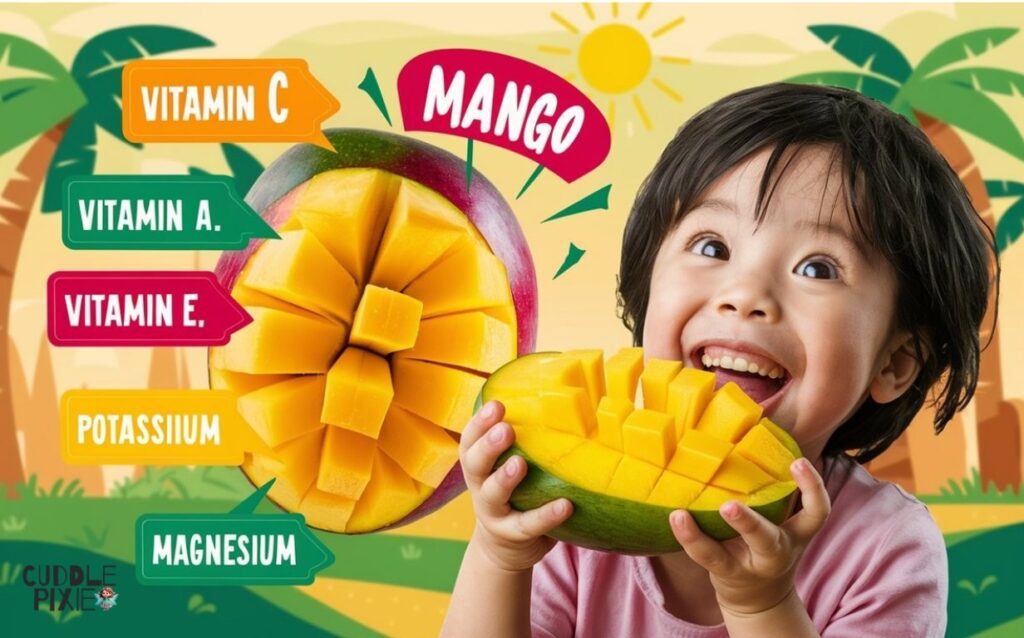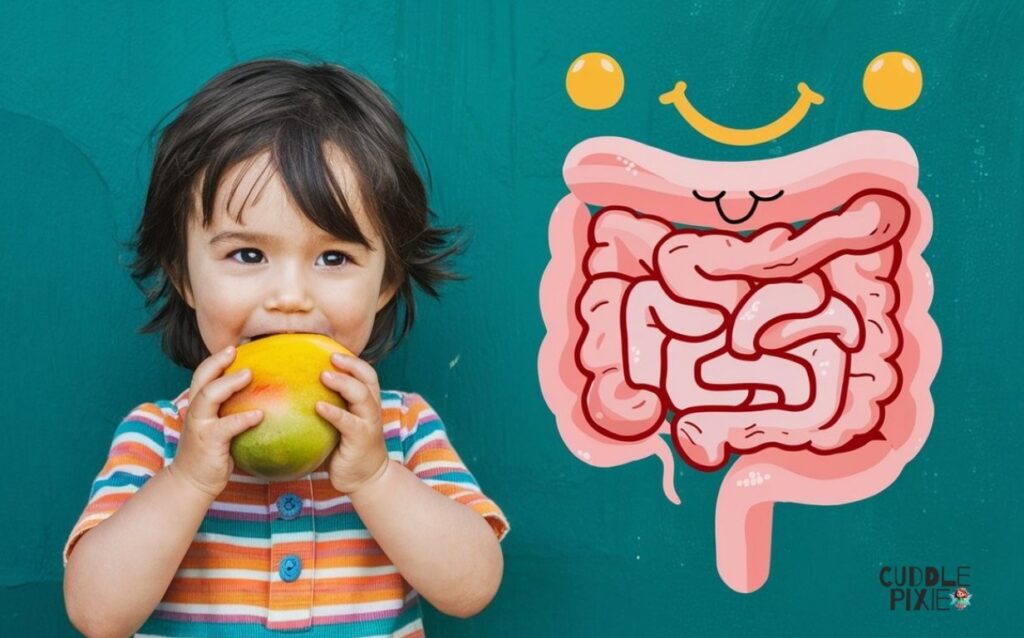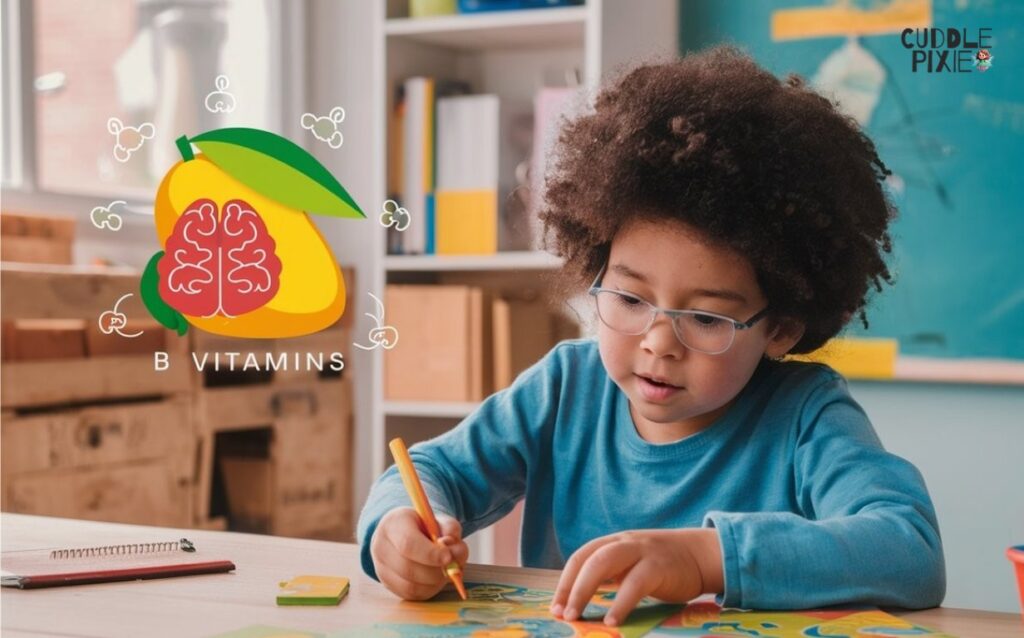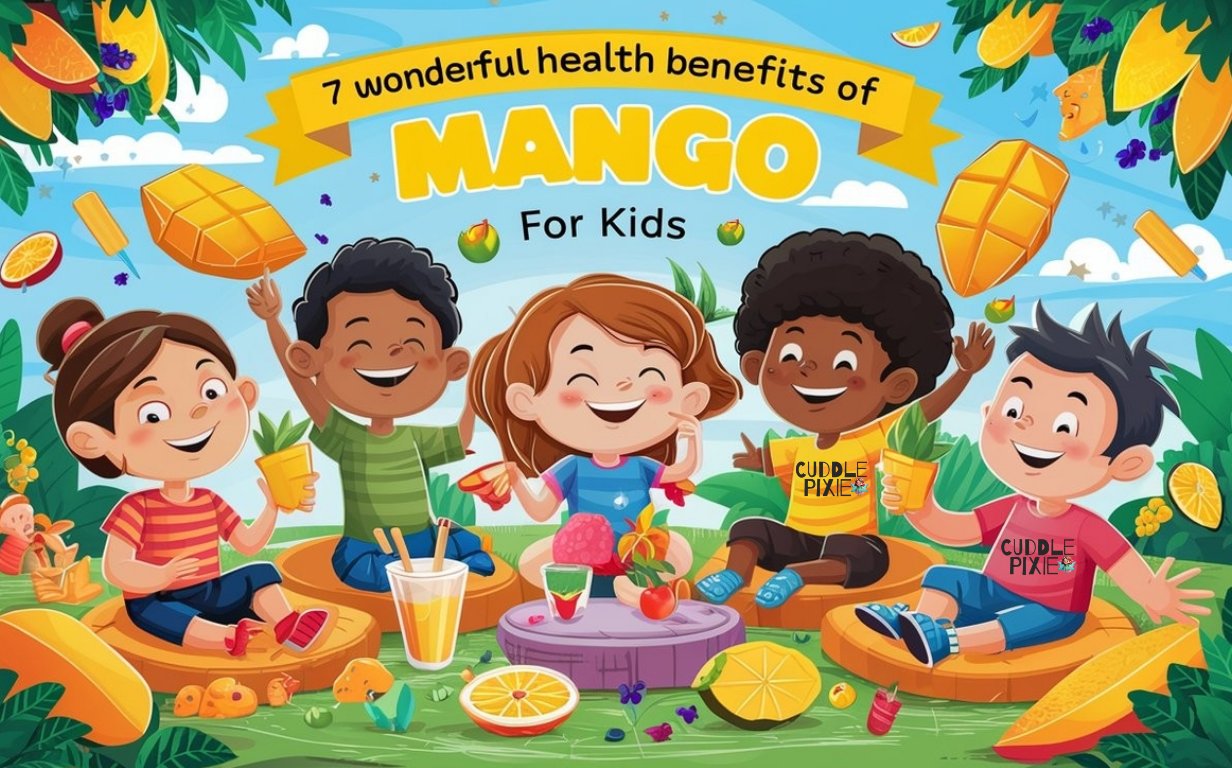It’s a sunny day, and children are playing outside with boundless energy. Imagine a refreshing, juicy mango slice in their hands, providing not just a delightful treat but a powerhouse of nutrients. Mangoes, often dubbed the “king of fruits,” are not only delicious but packed with essential nutrients that are vital for children’s growth and development. Let’s dive into the seven wonderful health benefits of mangoes for kids, and see why this tropical fruit should be a staple in their diet.
In This Article
Rich in Essential Nutrients

Mangoes are a treasure trove of vitamins and minerals that are crucial for children’s development. One cup of sliced mango provides:
- Vitamin C: Over 60% of the daily recommended intake. This vitamin is vital for immune function, skin health, and collagen formation.
- Vitamin A: Around 35% of the daily recommended intake. Essential for vision, growth, and immune function.
- Vitamin E: Supports skin health and acts as an antioxidant.
- Potassium and Magnesium: Important for maintaining healthy blood pressure and muscle function.
These nutrients collectively support a child’s overall health by boosting their immune system, aiding in growth, and maintaining healthy bodily functions. According to registered dietitian Ashley Koff, “Mangoes are nutrient-dense, offering a variety of vitamins and minerals that are essential for a child’s growth and development.”
Boosts Immunity

One of the standout nutrients in mangoes is Vitamin C, which plays a pivotal role in enhancing the immune system. Dr. William Sears, a renowned pediatrician, emphasizes that a strong immune system is crucial for children, particularly in their formative years when they are more susceptible to infections and illnesses.
Vitamin C stimulates the production of white blood cells, which are the body’s primary defense against infections. Regular consumption of mangoes can help children build a robust immune system, reducing the frequency and severity of common colds and infections.
Supports Eye Health

Mangoes are rich in Vitamin A and beta-carotene, both of which are essential for maintaining healthy vision. As children grow, their eyes are developing rapidly, and proper nutrition is key to supporting this process.
Vitamin A plays a critical role in maintaining the cornea, which is the eye’s surface. It also contributes to the functioning of the retina, helping prevent night blindness and other vision-related issues. Pediatric ophthalmologist Dr. Jane Edmond notes, “Ensuring adequate intake of Vitamin A through fruits like mangoes can support healthy eye development and prevent deficiencies that could lead to vision problems.”
Aids Digestion

Dietary fiber is another significant component of mangoes, aiding in the digestive health of children. One cup of mango provides about 3 grams of fiber, which is important for maintaining regular bowel movements.
Fiber helps in softening the stool and promoting regular bowel movements, preventing constipation—a common issue among children. Nutritionist Sarah Bester explains, “Fiber-rich fruits like mangoes not only aid in digestion but also support the gut microbiome, which is essential for overall health.”
Promotes Healthy Skin

The combination of Vitamin A, Vitamin C, and antioxidants in mangoes contributes to healthy, glowing skin. These nutrients help in repairing and rejuvenating the skin, making it an excellent fruit for children.
Vitamin A helps in the formation of new skin cells and reduces the risk of skin infections. Vitamin C supports collagen production, which is essential for skin elasticity and healing. Dr. Jessica Wu, a dermatologist, states, “Regular consumption of antioxidant-rich fruits like mangoes can protect children’s skin from damage and keep it healthy.”
Supports Brain Development

Mangoes contain Vitamin B6 and other B vitamins, which are crucial for brain development and function. These vitamins are involved in the synthesis of neurotransmitters that regulate mood and cognitive abilities.
Vitamin B6 is essential for the production of serotonin and dopamine, neurotransmitters that play a role in mood regulation and cognitive function. Dietitian Keri Glassman emphasizes, “Incorporating mangoes into a child’s diet can provide the necessary B vitamins that support brain health and improve concentration and learning abilities.”
Provides Energy

Children are always on the move, and they need a constant supply of energy. Mangoes, with their natural sugars and carbohydrates, provide a quick and sustainable energy boost.
The natural sugars in mangoes, such as fructose, glucose, and sucrose, provide a quick source of energy, while the carbohydrates offer sustained energy release. Pediatric nutritionist Jill Castle explains, “Mangoes are an excellent snack for active children, providing them with the energy they need to play and learn without the crash that comes from processed sugary snacks.”
Tips for Incorporating Mango into Kids’ Diet

Serving Suggestions
- Fresh mango slices as a snack.
- Mango smoothies blended with yogurt and other fruits.
- Mango salads with a mix of other colorful fruits.
Recipes
- Mango Popsicles: Blend mango puree with a bit of honey and freeze in molds for a refreshing treat.
- Mango Salsa: Diced mango mixed with tomatoes, onions, and cilantro, perfect as a dip or topping for grilled chicken.
- Mango Parfait: Layered with granola and yogurt for a healthy breakfast or snack.
Safety Tips
- Ensure mangoes are ripe to avoid digestive issues.
- Moderation is key; too much mango can lead to digestive discomfort due to its high fiber content.
- Be aware of potential allergies and introduce mangoes gradually if trying for the first time.
Final Thoughts
Mangoes are not just a tasty tropical treat; they are a nutritional powerhouse that offers numerous health benefits for children. From boosting immunity to supporting brain development and providing energy, mangoes can play a significant role in a child’s diet. Encourage your children to enjoy this delicious fruit, and watch them thrive with the essential nutrients it provides. Remember, a balanced diet filled with a variety of fruits, including mangoes, is the key to optimal health and development.
